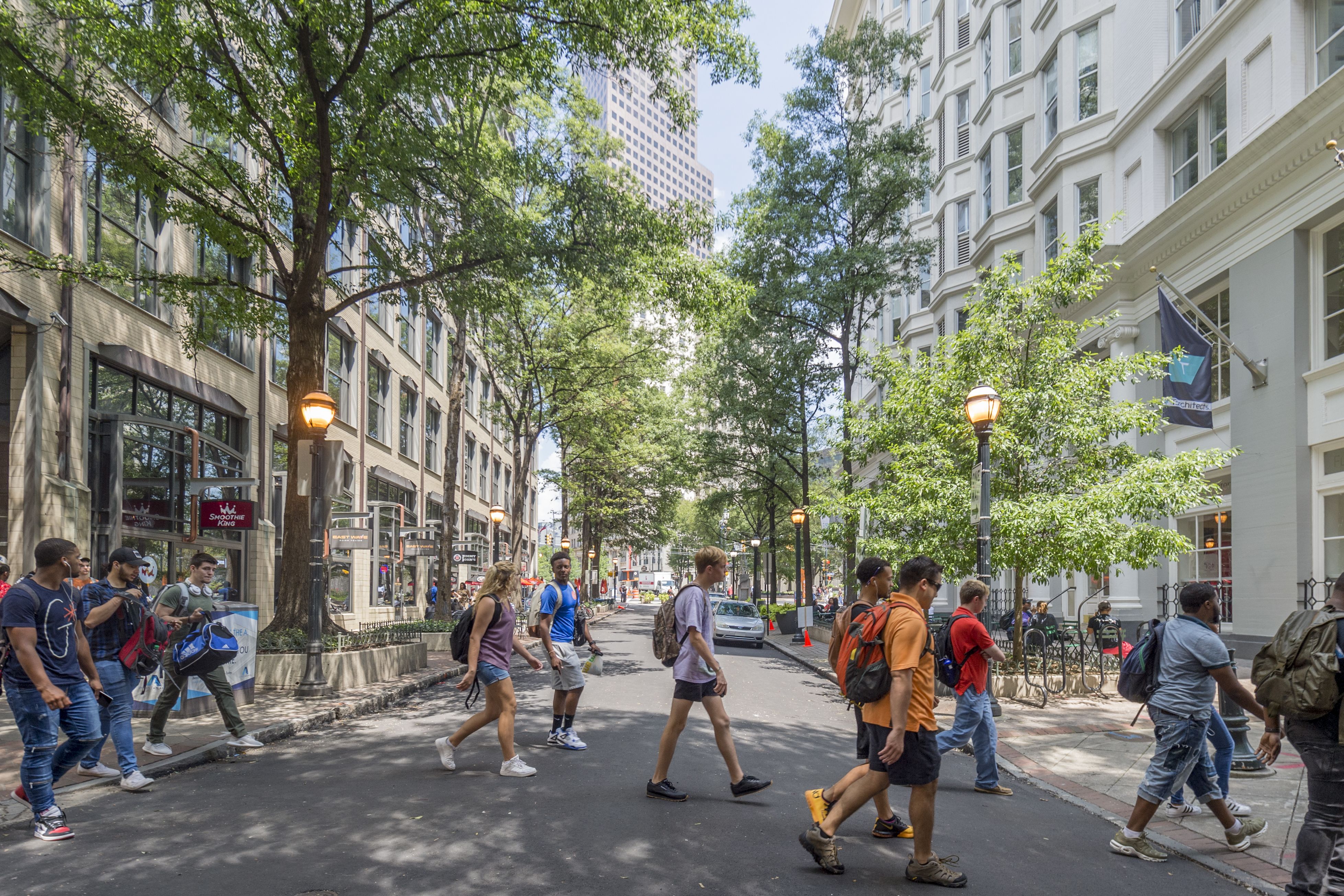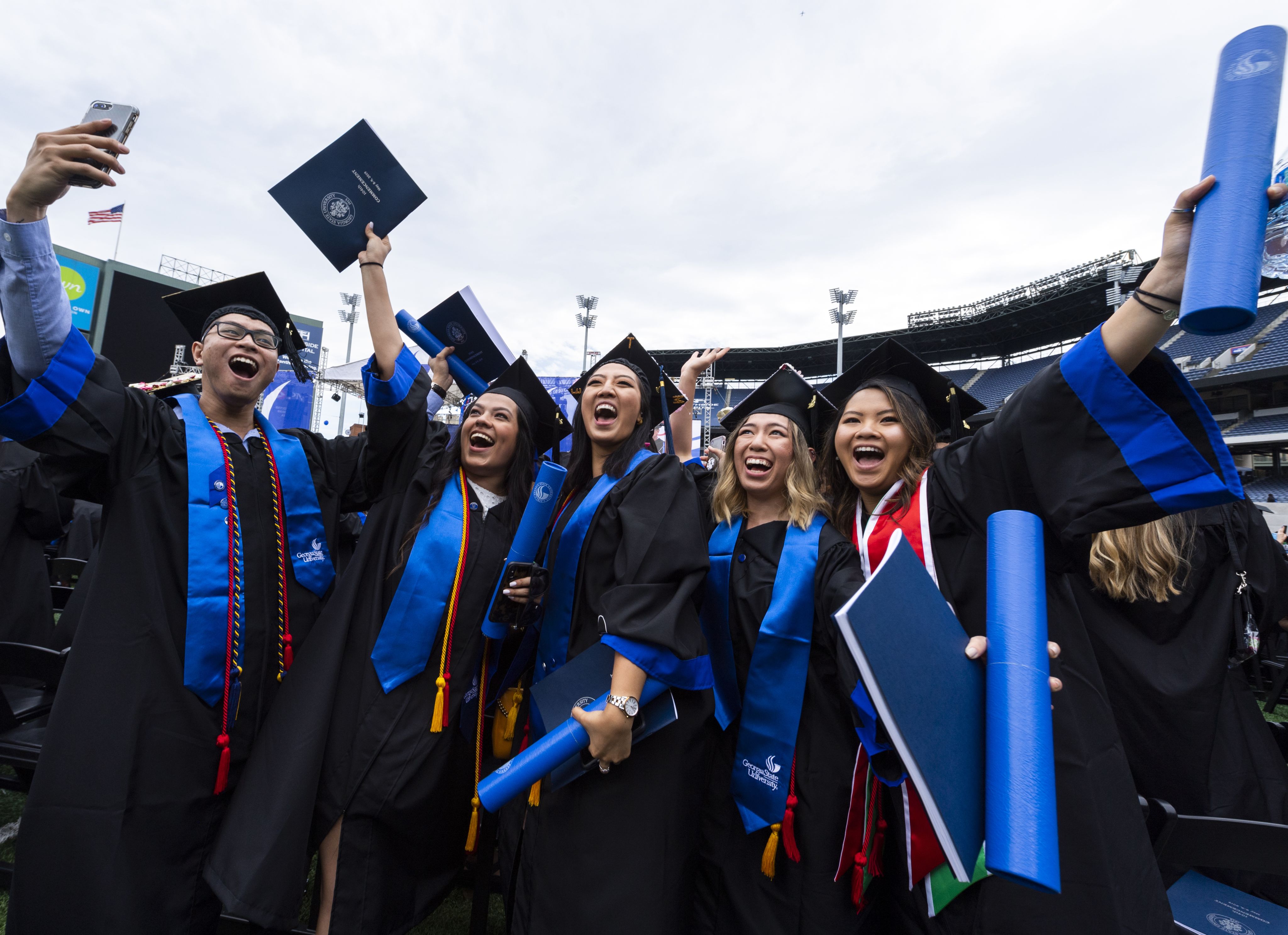Partnership Boosts Prospects for Atlanta's Tech Talents
How a public-private partnership at Georgia State is shaping an academic program advancing student economic mobility
By Ronald Barba

Partnership Boosts Prospects for Atlanta's Diverse Tech Talents
How a public-private partnership at Georgia State is shaping an academic program advancing student economic mobility
By Ronald Barba


She isn’t alone in her vocational goals. The vast majority of today’s undergraduates in the United States cite job preparation and placement as primary reasons for pursuing higher education. Mirroring public consensus on the value of a degree, students enrolled at colleges are demanding a return on their investments in the form of guaranteed employment. If college doesn't lead to a job, then what is it for?
He is part of the first cohort of a new program available to bachelor-degree students at Georgia State's downtown Atlanta Campus and associate-degree students at its Perimeter College campuses. Called “Emerging Engineer Empowerment”, or simply the E3 program, it's the result of a unique partnership among the university and CodePath, a technical education nonprofit focused on creating high-performing tech talent. Each student accepted into the program earns the designation of E3 Scholar and is provided with special resources tailored to prepare them for careers in tech.
An essential feature of the program: equip every E3 Scholar with the skills and knowledge to land at least one paid technical internship, possibly two, before they graduate. A report from Burning Glass Institute and Strada Institute found that students with internship experience while in college are less likely to be unemployed or underemployed five years after college. And according to studies done by the National Association of Colleges and Employers (NACE), women, Black, Hispanic, and first-generation students are underrepresented in paid internships. The E3 program — with its emphasis on equipping students from all backgrounds with the knowledge and tools to secure and to succeed in paid internships — aims to help students overcome these challenges.
Public confidence in securing a well-paying career with a bachelor's degree has waned over the last few years.
"How much do you agree or disagree with the idea that, in general, it is easier to find a well-paying, stable career if you received [a bachelor's degree] compared to having no education beyond high school?" New America, Varying Degrees 2024, (March 2024)
"How much do you agree or disagree with the idea that, in general, it is easier to find a well-paying, stable career if you received [a bachelor's degree] compared to having no education beyond high school?" New America, Varying Degrees 2024, (March 2024)
A college junior studying computer science at Georgia State, He’s route towards a bachelor's degree — and possibly a career in technology — could have looked entirely different. A first-generation student, whose parents are refugees from China, she represents a portion of the undergraduate student population that is statistically less likely to earn a degree within six years after starting college.
Growing up 30 minutes outside of Atlanta, in Sandy Springs, Ga., He developed a lot of her entrepreneurial spirit in the same way that many members of the Chinese diaspora have developed their notions around the American dream: helping her parents run their family restaurant. It was through them and their experiences that she learned firsthand the value of a college degree. But she also discovered that it would take more than a piece of paper to secure her economic standing, she said.
“When my parents were applying to jobs, they were denied white-collar careers because they didn’t have those degrees to show. But even a degree won’t make you successful. If you don’t have the network, and you don’t have those professional connections, you basically have to break into Corporate America by yourself.”

A college junior studying computer science at Georgia State, He’s route towards a bachelor's degree — and possibly a career in technology — could have looked entirely different. A first-generation student, whose parents are refugees from China, she represents a portion of the undergraduate student population that is statistically less likely to earn a degree within six years after starting college.
Growing up 30 minutes outside of Atlanta, in Sandy Springs, Ga., He developed a lot of her entrepreneurial spirit in the same way that many members of the Chinese diaspora have developed their notions around the American dream: helping her parents run their family restaurant. It was through them and their experiences that she learned firsthand the value of a college degree. But she also discovered that it would take more than a piece of paper to secure her economic standing, she said.
“When my parents were applying to jobs, they were denied white-collar careers because they didn’t have those degrees to show. But even a degree won’t make you successful. If you don’t have the network, and you don’t have those professional connections, you basically have to break into Corporate America by yourself.”

“Even a degree won’t make you successful. If you don’t have the network, and you don’t have those professional connections, you basically have to break into Corporate America by yourself.”

As an E3 Scholar, He is part of a growing network of student-peers pursuing technical careers. She has access to working software engineers and other industry professionals who serve as mentors, helping her to navigate the onerous technical interview process. In addition, the E3 program offers her CodePath courses designed in partnership with companies that are looking to hire tech talent, focusing on educating students in knowledge areas that are in high demand in the marketplace. For example, a course on cybersecurity — originally developed in collaboration with Meta — aims to address the industry shortage of cybersecurity talent by getting students interested earlier in their academic journeys.
He’s description of breaking into the professional world points to the hidden curriculum — the unwritten, implicit rules and values within society that are typically navigable for students from well-resourced, college-educated families — said Nanette Napier, a professor of computer information systems and associate chair of that department at Georgia State's J. Mack Robinson College of Business. “The partnership with CodePath is having an impact on helping our students figure out what that hidden curriculum is in order to help them get their foot in the door,” she added.
Part of that hidden curriculum, as He observed, is having the right connections. And within the tech industry, it may play a much larger role than in some other fields.
“We know that social connectedness — higher levels of social connectedness — and economic connectedness can lead to economic mobility,” said Isabelle Monlouis, a professor of practice at Georgia State’s Robinson College and associate director of the university’s Russell Center for Entrepreneurship, citing research from 2022 led by Raj Chetty, a professor of public economics at Harvard. According to that research, economic connectedness — the degree of interaction between low- and high-income people — has the highest potential for impacting upward mobility.
For the E3 program to succeed, Georgia State and CodePath knew that it was essential to create an environment and pathways that enable more interaction and development of meaningful relationships between the students and the people these students would one day become. They needed to create an environment where students could learn this hidden curriculum that would ease their transition into the professional world after college.
"The CodePath partnership at Georgia State is all about helping students make the right connections through various forms of engagement — whether that’s through industry mixers, mentorships or hands-on courses,” said Cynthia Y. Lester, associate provost for strategic initiatives at Georgia State. “It’s not just about technical skills. It’s about understanding the hidden curriculum — the unspoken rules and pathways that can help students break into the industry. Programs like this give our students a real shot at navigating tech careers with confidence."
Monlouis oversaw the initial implementation of the CodePath E3 program at Georgia State. She, in collaboration with the computer science and computer information systems departments, championed and advocated for the initiative and its potential impacts on Georgia State students.
Since the program’s launch in the spring 2024 semester, Monlouis along with colleagues Nanette Napier, John Augusto, associate dean for strategic initiatives at Georgia State's College of Arts & Sciences, and Barbara Johnson, dean of Perimeter College, have seen a rapid scaling of interest among students and several early successes — from the concrete, such as internship offers for several E3 Scholars in the first cohort, to the conceptual, like students’ heightened perceptions of self-worth and opportunity.
While designed thoughtfully and intentionally, the E3 program had unassuming origins, said Monlouis. A casual conversation with Georgia State alumna Alaina Percival (B.I.S. ’02, MBA ’08), cofounder and previous CEO of Women Who Code, turned into an introduction to Michael Ellison, cofounder and CEO of CodePath, and quickly developed into serious discussions around what the program would look like and who would be involved.
For creating any kind of academic program, explained Monlouis, “getting senior leadership support is critical.” That's especially true when an array of departments and colleges are involved, and even more so for a program requiring partnerships with organizations outside of the university.

Monlouis oversaw the initial implementation of the CodePath E3 program at Georgia State. She, in collaboration with the computer science and computer information systems departments, championed and advocated for the initiative and its potential impacts on Georgia State students.
Since the program’s launch in the spring 2024 semester, Monlouis along with colleagues Nanette Napier, John Augusto, associate dean for strategic initiatives at Georgia State's College of Arts & Sciences, and Barbara Johnson, dean of Perimeter College, have seen a rapid scaling of interest among students and several early successes — from the concrete, such as internship offers for several E3 Scholars in the first cohort, to the conceptual, like students’ heightened perceptions of self-worth and opportunity.
While designed thoughtfully and intentionally, the E3 program had unassuming origins, said Monlouis. A casual conversation with Georgia State alumna Alaina Percival (B.I.S. ’02, MBA ’08), cofounder and previous CEO of Women Who Code, turned into an introduction to Michael Ellison, cofounder and CEO of CodePath, and quickly developed into serious discussions around what the program would look like and who would be involved.
For creating any kind of academic program, explained Monlouis, “getting senior leadership support is critical.” That's especially true when an array of departments and colleges are involved, and even more so for a program requiring partnerships with organizations outside of the university.


Support and approval from the provost is the first step, but then it's often still a long road ahead.
“University-wide programs do not happen on their own,” said Richard Phillips, dean of the Robinson College of Business. “Getting all the various college deans, department chairs, faculty and administrative coordinators on the same page played a key role in determining the success of the E3 program. The department heads, for instance, ultimately decide what CodePath courses align with planned curricula and are key to students' engagement and retention. Administrative coordinators serve as the front line in responding to student inquiries about the benefits of participating in the program. It is a team effort.”
“We have learned that one position is critical to our success: the department chair. Sitting at the nexus of the student body, the faculty, and the administration, department chairs are perfectly placed to provide crucial leadership in the effort to help students progress toward graduation.”
“We’re looking for content that we don’t offer,” said Bala Ramesh, department chair of computer information systems at Georgia State. “There are a lot of things that CodePath offers that we don’t have space for and don't fit within our curriculum, but we’ve been able to identify several courses that supplement what we do here to enrich our students’ educational experience.”
For example, Ramesh said, E3 Scholars are introduced to web development and technical interview preparation — topics that his department has always wanted to cover in a hands-on way but hasn't had the resources to accommodate within the curriculum.
“The key to the success of our partnership with Georgia State is this consistent collaboration with the deans, chairs, and faculty,” said Keithe Williams, senior director of programs and community engagement at CodePath. “Developing partnerships with universities can be tricky. When we approach a university, we really emphasize the fact that we focus on bringing corporations into the classroom, specifically software engineers from those corporations, and working with them to help build out our curriculum. And because of that, we are nimble enough to keep pace with the changing advancements in technology and the changing needs of the industry.”
Williams describes the core pillars of the E3 program
“Higher education is notoriously resistant to change, and CodePath's proposition is often a hard pill to swallow for institutions that, traditionally, are not used to outsiders suggesting that they may be missing content or experiences that their students need,” said Ramesh. Georgia State, however, is renowned for its hyperfocus on student success — and it has an open-mindedness around forward-thinking strategies and tools that can help support that mission. That reputation has contributed to the partnership's success with CodePath in designing and implementing the E3 program.
“I think it’s a good model of industry collaboration with universities,” said Ramesh. “It also helps to bridge the gap between the availability of talent with the need for talent.”
Several other professors and administrators at Georgia State also say the collaborative model between higher ed and industry would be worth replicating at other institutions.
“I think it’s a good model of industry collaboration with universities. It also helps to bridge the gap between the availability of talent with the need for talent.”
Colleges and universities currently find themselves in a pivotal position. Covid-19 expedited enrollment contraction, and a looming enrollment cliff is set to further impact higher-ed institutions for the next five to 10 years. Questions around the value of a college education remain persistent. Budget shortfalls are forcing institutions to cut academic programs or outright shutter. Buffeted by these challenges, the university has to learn to innovate in order to face what’s ahead over the next decade.
Computer science and engineering students from Perimeter College on a tour of Delta headquarters. Critical to the future career success of students, administrators say, is early and direct exposure to industry professionals.
Computer science and engineering students from Perimeter College on a tour of Delta headquarters. Critical to the future career success of students, administrators say, is early and direct exposure to industry professionals.
Public-private partnerships, known as P3s, are not new to higher ed. But many challenges facing academic institutions have led to increasing interest from colleges looking to keep pace with changing demands. Campuses in desperate need of infrastructure upgrades, for example, rely on partnerships with tech companies to help them update aging technology to better handle the strain on limited resources. On its own, a college might take 10 years compared with what its partnership with a tech company could maybe accomplish in two.
In the latest survey of top administrators conducted by The Chronicle and P3•EDU, 74 percent reported seeing an increase in these partnerships on their campuses — a three-percent increase from the previous year. At Georgia State, and throughout higher-ed institutions around the country, administrators are looking to these P3s to help them safeguard against new challenges and discover ways to improve the student experience.
The importance of partnerships
“That kind of intentional, internal buy-in and partnership with Georgia State makes a big difference,” said a source with an expertise in coordinating partnerships between corporations and universities and who had a hand in planning the initiative at Georgia State. “I think with public-private partnerships, one area of opportunity is to really align around a common goal and to understand what each party can bring."
"If you enter into a partnership that is one-sided, inevitably that partnership will fail," she said. "One of the things that CodePath, in particular, has done well is to understand the gaps and the opportunities in what Georgia State was looking to solve for and to provide solutions to address that.”
The CodePath E3 program is supported by grants from the U.S. Economic Development Administration and the Kapor Foundation, among others. Some of the criteria used by funders to determine a program's grant eligibility and potential impact include:
- Connectivity and adoption — does an initiative connect people to digital resources?
- Work-force development — will a program create pathways to meaningful employment?
- Entrepreneurship — is there potential for a program to produce individuals who can lead or start organizations that can give back to their communities?
“As we think about some of the ways in which these young people come out of the E3 program, they might become the next CTOs. But they may also start their own businesses and then, in turn, be able to hire individuals from their communities.”

“They might become the next CTOs. But they may also start their own businesses and then, in turn, be able to hire individuals from their communities.”
According to the same source, Georgia State’s and CodePath’s abilities to cultivate good relationships with the mayor’s office in Atlanta has been essential to identifying and nurturing young tech talent to further build the tech ecosystem in Atlanta. Investment in the CodePath E3 program is just one of many examples where public and private organizations have come together to support underrepresented tech talent in the Atlanta region.
“We really are trying to make sure that Atlanta is seen as a technology ecosystem; that ecosystem is ripe for investment and support,” Atlanta's Mayor Andre Dickens told Punchbowl News. Since taking office in 2021, Mayor Dickens has made clear his intentions to turn Atlanta into one of the top five tech ecosystems in the U.S. As a native Atlantan, he’s emphasized tech opportunities as a pathway out of poverty. And he wants to make sure that the tech companies that come into the city tap into Atlanta's talent pool.
Over the last few years, Atlanta has attracted Big Tech companies, like Microsoft and Google, to set up corporate satellite offices. The city has also seen a gradual increase in venture-capital investments in high-tech startups. But more partnerships like that between Georgia State and CodePath could help transform Atlanta into a key tech-innovation hub.
In a report produced by Boston Consulting Group, in early 2024, greater coordination with higher-ed institutions was cited as one of four pathways towards transforming it into a top city for innovation and entrepreneurship. Around the same time, the mayor’s Office of Technology and Innovation announced the creation of the Atlanta Collegiate Entrepreneurship Syndicate (ACES), a consortium of colleges and universities that work to bridge the gaps between academia, industry, and government, and to develop Atlanta’s tech ecosystem. Georgia State is a part of the consortium.
“We feel like Atlanta has all of the tools and all of the energy to drive success, to drive entrepreneurship, and to drive technical innovation,” said Williams from CodePath. “We can really develop social impact and really create institutional wealth within communities that have not traditionally experienced that kind of success.”

According to the same source, Georgia State’s and CodePath’s abilities to cultivate good relationships with the mayor’s office in Atlanta has been essential to identifying and nurturing young tech talent to further build the tech ecosystem in Atlanta. Investment in the CodePath E3 program is just one of many examples where public and private organizations have come together to support underrepresented tech talent in the Atlanta region.
“We really are trying to make sure that Atlanta is seen as a technology ecosystem; that ecosystem is ripe for investment and support,” Atlanta's Mayor Andre Dickens told Punchbowl News. Since taking office in 2021, Mayor Dickens has made clear his intentions to turn Atlanta into one of the top five tech ecosystems in the U.S. As a native Atlantan, he’s emphasized tech opportunities as a pathway out of poverty. And he wants to make sure that the tech companies that come into the city tap into Atlanta's talent pool.
Over the last few years, Atlanta has attracted Big Tech companies, like Microsoft and Google, to set up corporate satellite offices. The city has also seen a gradual increase in venture-capital investments in high-tech startups. But more partnerships like that between Georgia State and CodePath could help transform Atlanta into a key tech-innovation hub.
In a report produced by Boston Consulting Group, in early 2024, greater coordination with higher-ed institutions was cited as one of four pathways towards transforming it into a top city for innovation and entrepreneurship. Around the same time, the mayor’s Office of Technology and Innovation announced the creation of the Atlanta Collegiate Entrepreneurship Syndicate (ACES), a consortium of colleges and universities that work to bridge the gaps between academia, industry, and government, and to develop Atlanta’s tech ecosystem. Georgia State is a part of the consortium.
“We feel like Atlanta has all of the tools and all of the energy to drive success, to drive entrepreneurship, and to drive technical innovation,” said Williams from CodePath. “We can really develop social impact and really create institutional wealth within communities that have not traditionally experienced that kind of success.”

“Atlanta has all of the tools and all of the energy to drive success, to drive entrepreneurship, and to drive technical innovation. We can really develop social impact and really create institutional wealth within communities that have not traditionally experienced that kind of success.”
For Jessica He and her peers in the program, these intentional connections — between the university, local industry, CodePath, and the city of Atlanta — have enabled them to start building the social and professional networks that can help them to better navigate their future careers. And she hopes that future participants can gain the same benefits, if not more, that she's been provided.
“Being in the first cohort of E3 Scholars makes me feel like my voice and my feedback really matters, and that my experience will help shape the experiences of others after me,” said He. CodePath, she said, is "offering courses and insights relevant to the tech industry that normally aren’t offered here, and they’re making this information accessible to everyone.”
The CodePath E3 program is entering its second year at Georgia State and Perimeter College, and will be led by Joyelle Harris, the new director of the university's Entrepreneurship and Innovation Institute.
Harris emphasized how crucial the partnership is going to be to ensure that students like He can confidently establish careers in tech.
“This partnership has already made a tremendous impact at Georgia State, and I am thrilled to build on its success,” she said. “This initiative is not just about technical training — it’s about opening doors, fostering connections and ensuring that our students are equipped to thrive in the ever-evolving tech landscape."

For Jessica He and her peers in the program, these intentional connections — between the university, local industry, CodePath, and the city of Atlanta — have enabled them to start building the social and professional networks that can help them to better navigate their future careers. And she hopes that future participants can gain the same benefits, if not more, that she's been provided.
“Being in the first cohort of E3 Scholars makes me feel like my voice and my feedback really matters, and that my experience will help shape the experiences of others after me,” said He. CodePath, she said, is "offering courses and insights relevant to the tech industry that normally aren’t offered here, and they’re making this information accessible to everyone.”
The CodePath E3 program is entering its second year at Georgia State and Perimeter College, and Monlouis emphasized how crucial the partnership is going to be to ensure that students like He can confidently establish careers in tech.
“Over time," said Monlouis, "this partnership will help us do it bigger. Students are responding very strongly to the program — it may be growing faster than we anticipated. And it's going to take a village to successfully meet them where they are.”

Created by Chronicle Brand Studio in partnership with Ascendium




